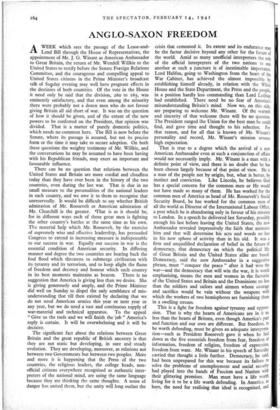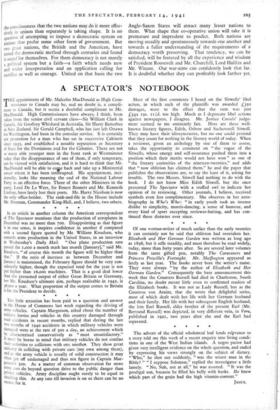ANGLO-SAXON FREEDOM
AWEEK which sees the passage of the Lease-and- Lend Bill through the House of Representatives, the appointment of Mr. J. G. Winant as American Ambassador to Great Britain, the return of Mr. Wendell Willie to the United States to testify before the Senate Foreign Relations Committee, and the courageous and compelling appeal to United States citizens in the Prime Minister's broadcast talk of Sunday evening may well have pregnant effects in the destinies of both countries. Of the vote in the House it need only be said that the division, 260 to 165, was eminently satisfactory, and that even among the minority there were probably not a dozen men who do not favour giving Britain all aid short of war. It was on the question of how it should be given, and of the extent of the new powers to be conferred on the President, that opinion was divided. That is a matter of purely domestic politics, which needs no comment here. The Bill is now before the Senate, where its passage is assured, but not its precise form or the time it may take to secure adoption. On both these questions the weighty testimony of Mr. Willkie, and the conversations he may be assumed to have been having with his Republican friends, may exert an important and favourable influence.
There can be no question that relations between the United States and Britain are more cordial and cloudless today than they have ever been in the history of the two countries, even during the last war. That is due in no small measure to the personalities of the national leaders in each country, and we owe it to them to recognise that unreservedly. It would be difficult to say whether British admiration of Mr. Roosevelt or American admiration of Mr. Churchill is the greater. 'That is as it should be, for in different ways each of those great men is fighting the other country's battles at the same time as his own. The material help which Mr. Roosevelt, by the exercise of supremely wise and effective leadership, has persuaded Congress to extend in increasing measure is indispensable to our success in war. Equally our success in war is the essential condition of American security. In differing manner and degree the two countries are beating back the foul flood which threatens to submerge civilisation with its tyranny and its terrorism, and to keep alight the flame of freedom and decency and honour which each country in its best moments maintains as beacon. There is no suggestion that America is giving less than we desire. She is giving generously and amply, and the Prime Minister did well on Sunday to dispel the only semblance of mis- understanding that till then existed by declaring that we do not need American armies this year or next year or any year, but we do need a vast and continuous supply of war-material and technical apparatus. To the appeal " Give us the tools and we will finish the job " America's reply is certain. It will be overwhelming and it will be decisive.
The significant fact about the relations between Great Britain and the great republic of British ancestry is that they are not static but developing, in sure and steady evolution. They are developing, moreover, as relations not between two Governments but between two peoples. More and more it is happening that the Press of the two countries, the religious leaders, the college heads, non- official citizens everywhere recognised as authentic inter- preters of the national mind, are using the same language because they are thinking the same thoughts. A sense of danger has united them, but the unity will long outlast the crisis that cemented it. Its extent and its endurance may be the factor decisive beyond any other for the future of the world. Amid so many unofficial interpreters the role of the official interpreters of the two nations to one another at such a juncture is of inestimable importance. Lord Halifax, going to Washington from the heart of the War Cabinet, has achieved the almost impossible by establishing himself already, in relation with the White House and the State Department, the Press and the people, in a position hardly less commanding than Lord Lothian had established. There need be no fear of America's misunderstanding Britain's mind. Now we, on this side, are preparing to welcome Mr. Winant. Of the warmth and sincerity of that welcome there will be no question. The President ranged the Union for the best man he could find, and gave time and thought to his selection. For that reason, and for all that is known of Mr. Winant's personality and record, Mr. Winant's mission arouses high expectation.
That is true to a degree which the arrival of a new American Ambassador even at such a conjunction of affairs would not necessarily imply. Mr. Winant is a man with a definite point of view, and there is no doubt that he has been chosen largely because of that point of view. He is a man of the people not by origin, but, what is better, by instinct and conviction. Like Lincoln, he believes God has a special concern for the common men or He would not have made so many of them. He has worked for the common men of America as head of Mr. Roosevelt's Social Security Board, he has worked for the common men of all the world as Director of the International Labour Office, a post which he is abandoning only in favour of his mission to London. In a speech he delivered last Saturday, possibly enough his last before leaving the United States, the new Ambassador revealed impressively the faith that animates him and that will determine his acts and words no less in his new sphere of activity than in his old. It was a firm and unqualified declaration of belief in the future of democracy, that democracy on which the political life of Great Britain and the United States alike are based. Democracy, said the new Ambassador in a suggestive phrase, must " conquer the peace " after it had won the war—and the democracy that will win the war, it is worth emphasising, means the men and women in the factories of the United States and Britain and the Dominions no less than the soldiers and sailors and airmen whose courage and sacrifice would be vain without the weapons with which the workers of two hemispheres are furnishing them in a swelling stream.
This is a fight for freedom against tyranny and oppres- sion. That is why the hearts of Americans are in it no less than the hearts of Britons, even though America's part and function and our own are different. But freedom, to be worth defending, must be given an adequate interpreta- tion—such as President Roosevelt gave it when he laid down as the five essentials freedom from fear, freedom of information, freedom of religion, freedom of expression. freedom from want. Mr. Winant in his speech of Saturday carried that thought a little further. Democracy, he said, had been unprepared for this war because its failure to solve the problems of unemployment and social security had played into the hands of Fascism and Nazism with their glittering promises. Man must have a life worth living for it to be a life worth defending. In America, as here, the need for realising that ideal is recognised, and the consciousness that the two nations may do it more effec- tively in unison than separately is taking shape. It is no question of attempting to impose a democratic system on nations that prefer some other form of government. But two great nations, the British and the American, have tested the democratic method through centuries and found it sound for themselves. For them democracy is not merely a political system but a faith—a faith which needs new and wider interpretation and an application calling for sacrifice as well as courage. United on that basis the two Anglo-Saxon States will attract many lesser nations to them. What shape that co-operative union will take it is premature and imprudent to predict. Both nations are moving steadily and spontaneously towards one another and towards a fuller understanding of the requirements of a democracy worth preserving. That tendency, we can be satisfied, will be fostered by all the experience and wisdom of President Roosevelt and Mr. Churchill, Lord Halifax and Mr. Winant. Our war-aims can confidently look that far. It is doubtful whether they can profitably look farther yet.































 Previous page
Previous page